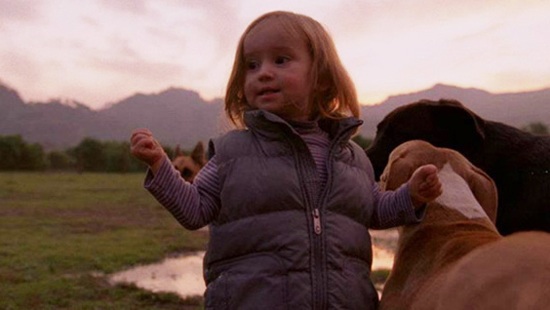
2013 kicked off with the wide theatrical release of TEXAS CHAINSAW 3D, which, like so many first-weekend-of-January releases, was a horror film and not a particularly good one. To be honest, I had to hit up Box Office Mojo to remind myself which crappy horror flick opened the year; that I initially thought it was THE DEVIL INSIDE speaks to a) my stubborn refusal to maintain an annual "films viewed" list, b) the fleetingness of TEXAS CHAINSAW 3D and c) the fact that I saw three very-good-to-great horror movies within a month of choking that sucker down. Why linger on a halfhearted franchise relaunch by the disinterested director of TAKERS when you've got Park Chan-wook's STOKER, Don Coscarelli's JOHN DIES AT THE END and the final two segments of V/H/S/2 to chew on?
This was the way of 2013: for every lousy movie thrust upon the public, there seemed to be two or three that were at least worthwhile. Even during the summer, when quality is typically scarce, the indies complemented the big studio tentpoles with Sundance discoveries that lived up to the high-altitude hype (THE KINGS OF SUMMER, IN A WORLD..., THE SPECTACULAR NOW) and triumphs from world-class filmmakers (BEFORE MIDNIGHT, FRANCES HA and DRUG WAR). Best of all, moviegoers outside of the major markets always had viable VOD offerings to offset the screen-hogging likes of STAR TREK INTO DARKNESS, GROWN-UPS 2 and WORLD WAR Z. There was never a reason to lament a lack of options or quality; the movies came through in a shockingly big way this year.
As my friend Jeff Mahler recently noted, the VOD/streaming revolution is exposing viewers all over the world to new voices and more artistically adventurous styles of filmmaking. Previously, consumers had to head to the local video store, where they'd generally peruse the shelves for low-risk entertainment (seeing as how they had to pay for each movie and return the fucking thing on time); now, they can take a shot at something weird on Netflix Instant and hop off the moment it loses them. There's zero risk. And while I know Shane Carruth's UPSTREAM COLOR isn't for most people, I love that some kid hundreds of miles from the nearest arthoust can read a rave out of Sundance on Ain't It Cool News, and, within a few months, have access to it via streaming. That kid will not only experience a movie well outside of the mainstream, he'll also (hopefully) be encouraged to tell intensely personal, unconventionally structured stories no matter how odd some may perceive them to be. A movement of young filmmakers unencumbered by the Joseph Campbell's "Hero's Journey" dogma? Not since the indie film revolution of the '90s have I been this excited about the future of cinema.
As for studio filmmaking, sequels and films based on preexisting intellectual property dominated once again, but Warner Bros was rewarded handsomely for backing Alfonso Cuarón's marooned-in-space adventure GRAVITY. Though WB gave themselves a movie-star safety net by casting George Clooney and Sandra Bullock, the film was sold primarily on spectacle; you had to see GRAVITY on the big screen (in 3D IMAX or Dolby Atmos) or you were missing out. Audiences bought in, and GRAVITY has currently grossed $653 million worldwide. And there were other non-franchise successes at the box office: Paul Greengrass's CAPTAIN PHILLIPS, James Wan's THE CONJURING, LEE DANIELS' THE BUTLER and Seth Rogen/Evan Goldberg's THIS IS THE END all relied on good reviews/word-of-mouth and clever marketing to crack $100 million domestic.
In compiling my top ten, I found myself locked in on five titles and debating the merits of about twenty others. I submitted a list to the Village Voice critics poll early in December, and, save for one significant addition, I generally stuck with it here. I'm good with this list. For now. Check back in a year, and it might look a little different. I've a feeling that the top two films could swap spots in time.
As always, the disclaimer: these are the films that I feel succeeded ecstatically on their own terms. In other words, if I see the CITIZEN KANE of cheerleader movies, you best believe that I will rank that film ahead of a hugely ambitious superhero yarn that falls a little short of its lofty goals. Of course, you may disagree. That's fine. No shame in being wrong.
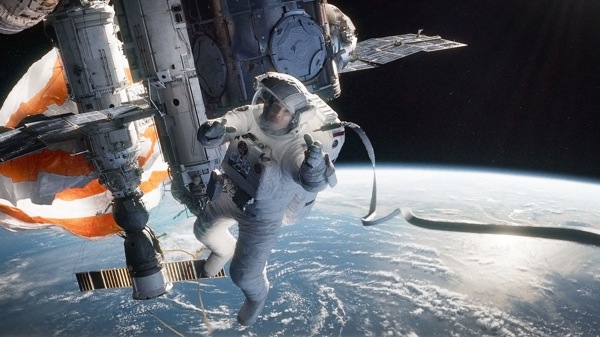
10. GRAVITY (d. Alfonso Cuarón, w. Aflonso & Jonas Cuarón)
The working subtitle of Cuarón's seventh feature was "A Space Adventure in 3D", which suggests that giving the audience a memorable moviegoing experience was every bit as important as telling a good story. It's a pretty simple yarn: two astronauts (George Clooney and Sandra Bullock) with a very limited supply of oxygen scramble to find a way home after their spacecraft is irreparably damaged in a debris shower. Cuarón and his co-writer son are far from subtle with their themes of survival and spiritual rebirth, but at a brisk ninety minutes, the ticking-clock urgency of the ordeal doesn't give them time to get precious about much of anything (though Clooney's hallucinated reappearance is more convenient than clever). What matters most is the in-the-moment ingenuity of Bullock's character and Cuarón's fluid, miraculously unobtrusive visuals. Perhaps even more impressive than Cuarón's lengthy single shots is Gleen Freemantle's vibrating sound design, which was as much a musical composition as Steven Price's score; viewed in Dolby Atmos, the film literally shakes you up (in ways far more artful than the cloddish D-Box ever could). GRAVITY is a grand reminder that there's no substitute for a night out at the movies.
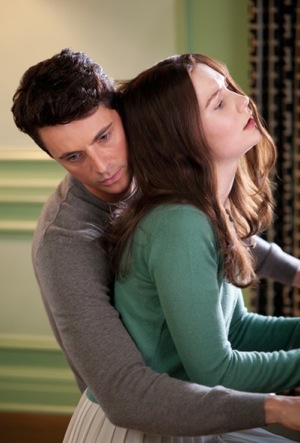
9. STOKER (d. Park Chan-wook, w. Wentworth Miller)
From the introduction to my interview with Park Chan-wook: "[STOKER] is anything but a tentative flirtation with Hollywood. From the opening shot, this pitch-black coming-of-age tale is instantly identifiable as the work of the South Korean auteur who gave us OLDBOY and the SYMPATHY FOR... films. As eighteen-year-old India (Mia Wasikowska) stands off to the side of the road, shot from a low angle, dress flowing in the wind (freeze-framed just as the hem kicks up to a slightly unwholesome height), we feel a perverse exhilaration. With little to go on but this cryptic imagery, we nonetheless know beyond the, er, shadow of a doubt that this story is destined to end in an awful, bloody, kinky mess - and given Park's tremendous cinematic gifts, we can't wait to take that sordid journey. That this is all about to occur in a film fronted with a studio logo makes it all the more unexpected and thrilling. STOKER is a meticulously designed film, with every detail in the house - stuffed birds, the profondo rosso of Kidman's boudoir, and the baby grand piano rather insistently positioned in the front room - placed as such to emphasize the narrative's peculiar mix of sexual dread and yearning. Park's visual storytelling is so precise you could probably watch STOKER on mute and easily follow along, but then you'd be depriving yourself of the film's most sensuous element: sound. Everything from the foreboding echo of footsteps on a hardwood floor to the yawning sustain of the baby grand (particularly during the sexually-charged duet between India and Charlie) heightens the film's aberrant sensuality. Thematically, STOKER seems as rife with contradictions as Park's other films: yes, it's awash in notions about sexual and psychological awakenings, but the reverie's the thing. Given that filmmaking of this quality is at a premium nowadays, I'm fine with some stylish delirium that, perhaps, signifies little."
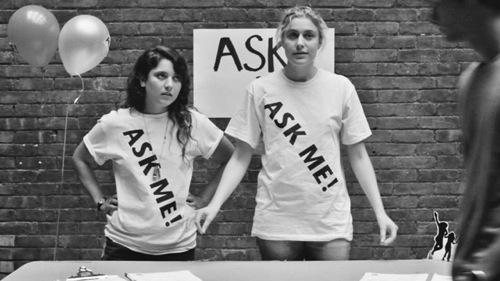
8. FRANCES HA (d. Noah Baumbach, w. Baumbach and Greta Gerwig)
Another year, another transcendent Greta Gerwig performance. This is in no way getting old. After subjecting her to the abrasive misanthropy of Ben Stiller's titular character in GREENBERG, Noah Baumbach has re-teamed with Gerwig to co-write a whimsical comedy about the impulsive misadventures of an aimless twenty-seven-year-old Vasser grad. Baumbach's penchant for comedic discomfiture is perfectly matched to Gerwig's affinity for gregarious klutzes; she's a pro at talking her way into humiliating situations, and Baumbach's an ace at staging them. Whereas Baumbach's last few films (GREENBERG, MARGOT AT THE WEDDING and THE SQUID AND THE WHALE) have crescendoed to acts of extreme emotional cruelty, FRANCES HA maintains a cheerfully rambunctious tone informed by the early films of Francois Truffaut; you wince at Frances's awful choices, but you never feel like she's fixed on a downward spiral. She's young, plucky and too in love with the possibilities of the great big world around her to be defeated. It's an ebullient celebration of fucking up in your twenties.
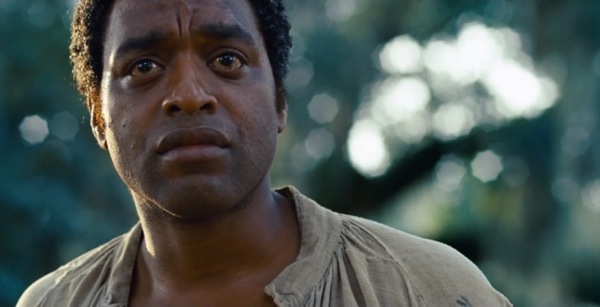
7. 12 YEARS A SLAVE (d. Steve McQueen; w. John Ridley, based on the memoir by Solomon Northup)
It took until 2013 for a major Hollywood studio to release a straight (i.e. non-exploitative), unflinching drama about America's original sin, and I can't imagine a better man to tell the story than the rigorously unsentimental Steve McQueen. In films like HUNGER and SHAME, McQueen documented the dehumanizing toll of imprisonment and addiction. These were but prelude to the wanton inhumanity depicted in 12 YEARS A SLAVE, which recounts the kidnapping and lengthy enslavement of free-born Solomon Northup (Chiwetel Ejiofor). Working from a career-best screenplay by John Ridley, McQueen and Ejiofor guide the viewer through an unremittingly harrowing ordeal where Northup's owners are distinguished by varying degrees of cruelty (only Benedict Cumberbatch's William Ford registers as a respectable human being). It is a tough film to endure, but Ejiofor's carefully modulated performance keeps you from getting lost in the horror show; Solomon's strength and determination - in the face of unimaginable evil and near-certain death - to return to his life as a free man is its own kind of dogged hope.
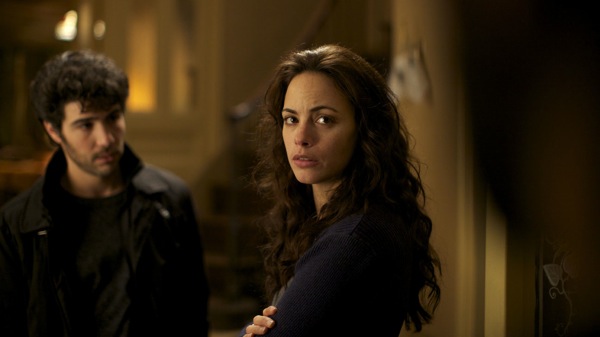
6. THE PAST (d. Asghar Farhadi; w. Farhadi, adapted by Massoumeh Lahidji)
The writer-director of 2011's masterful A SEPARATION returns with another carefully calibrated drama about a family in crisis. There are no heroes or villains in Farhadi's films, just people who are driven by their own desires, sometimes at the expense of someone else's happiness. In THE PAST, we have a divorcing couple (Ali Mosaffa and Berenice Bejo) contending with their oldest daughter's distaste for her mother's fiance. This may sound like a run-of-the-mill drama, but Farhadi meticulously peels back the layers of the various familial disagreements, continually challenging our sympathies until we identify on some level with all of the characters. It's hard not to marvel at Farhadi's sure grasp of dramatic technique when so few writers take the extra effort to examine their characters from different perspectives. Too often the dramatis personae are deployed as easily-identifiable archetypes. Farhadi understands this, and adroitly subverts our expectations. But this isn't a playful subversion; it's a consistent unpredictability dictated by the whims and wants of each character. It's the height of dramatic writing.
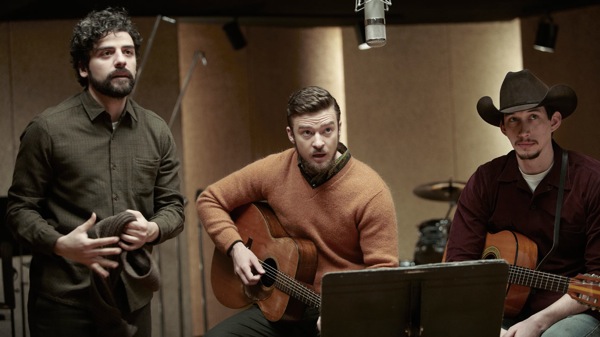
5. INSIDE LLEWYN DAVIS (w. & d. Joel and Ethan Coen)
The Coens set up shop in the early '60s Greenwich Village folk scene, and of course find a protagonist who might amount to something if he could just get out of his own way. Of course he never, ever will, and the fun of INSIDE LLEWYN DAVIS lies in trying to figure out whether his consignment to the footnotes of folk music history is punishment for being an asshole or a punch line to some inexplicable cosmic joke. It's also possible that there's nothing really inside Llewyn Davis (we never hear him perform an original song) - at least, nothing that would distinguish him from the genuine article glimpsed in the film's final scene (crooning his own composition). As always, the Coens invite definitive interpretations only to frustrate them by leaving one or two things purposefully vague (check out the Great Gorfein Debate on Twitter), and they get away with it by remaining two of the most talented filmmakers on the planet. It should be noted that this is one of their warmest movies, if only because of the music and those damn cats.
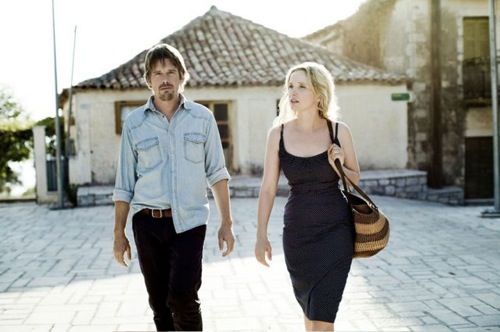
4. BEFORE MIDNIGHT (d. Richard Linklater, w. Linklater, Julie Delpy & Ethan Hawke)
If it seemed too much to ask that BEFORE SUNSET live up to the delicately perfect BEFORE SUNRISE, it felt like a near certainty that BEFORE MIDNIGHT, the third film in Richard Linklater's Celine & Jesse trilogy, would disappoint. But Linklater and his stars/co-writers, Julie Delpy and Ethan Hawke, understand these characters so intimately that they don't know how to betray them. Every creative choice makes sense: Celine and Jesse appeared to be headed toward a long-lasting relationship at the end of SUNSET, so we're not thrown at all by the reveal of the twins. Unfortunately, having been together for so long, we also know that the bloom must be off their magical romance, and so we do not flinch as they bicker with a ferocity unseen in the previous two movies. It's the most melancholy film in the series, but our affection for the characters is undiminished; they may be annoying at times, but they'd be absolutely obnoxious if they were still completely enamored of each other. This is the way we love - and, perhaps, separate. Here's hoping this trio continues to mark the time. See you in 2022?
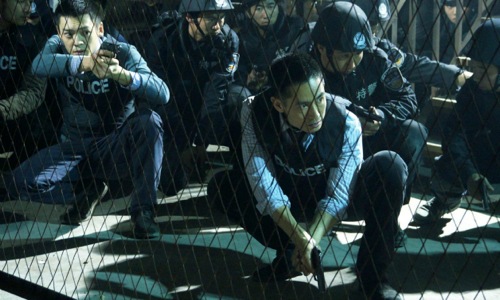
3. DRUG WAR (d. Johnnie To, w. Wai Ka-fei)
From the introduction to my interview with Johnnie To: "The blunt title says it all: DRUG WAR is a brutally stark cops-versus-traffickers crime flick that has little time for backstory or other narrative adornments. The film's stripped-down vibe is largely the result of To's attempts to appease Mainland Chinese censors, who tend to be resistant to less-than-heroic depictions of police officers. But this works to the film's advantage in that the cops, so proficient in the execution of their sting operation, are perilously out of their depth when thrown curveballs by the criminals. They might be able to look the part, but they're tragically unprepared when it comes down to doing the dirty business required of the profession (e.g. imbibing the product they're pretending to push). They're a bunch of Joe Fridays: by-the-book, and ultimately at a disadvantage because of this. To and frequent co-writer Wai Ka-fai hew to the conventions of the genre in many ways, but they put enough topspin on the story to keep viewers completely off-balance. There are some original flourishes (particularly the deaf-mute brothers who prove anything but impaired when their factory is raided), but the twists are generally subtle. DRUG WAR is just a masterfully constructed crime thriller from a director who knows all the angles. It's just the best pure action film of the year."
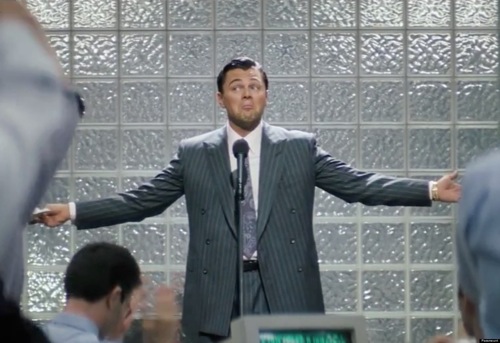
2. THE WOLF OF WALL STREET (d. Martin Scorsese; w. Terence Winter, based on the book by Jordan Belfort)
Seventy-one-year-old Martin Scorsese dives through the ropes and goes after Jordan Belfort's account of Wall Street impropriety like an in-his-prime middleweight pummeling a club stiff. Scorsese's been there, done that with gangsters - guys who didn't just ruin lives, they ended them. Taking on a shit-talking broker who did his crime largely over the phone is child's play for one of our greatest living filmmakers. This is a vigorously vulgar study of an amoral scumbag who accumulated an insane amount of wealth in a ludicrously short period of time, and he's been brought to big-screen life with an inspired screwball-comedy zeal by Leonardo DiCaprio (turning in a career-best performance). It's a gloriously excessive movie, but devoid of the nostalgic warmth that made the first half of GOODFELLAS so seductive. There's nothing attractive or endearing about these coked-up monsters; they inhabit a non-stop, misogynistic bacchanal that's doomed to end in indictments or death. Scorsese plays the film as a brutally black comedy; it's a shock to the system for a country that isn't nearly as outraged at white-collar crime as it should be. The only thing it's glorifying is the limitless potential of cinema.
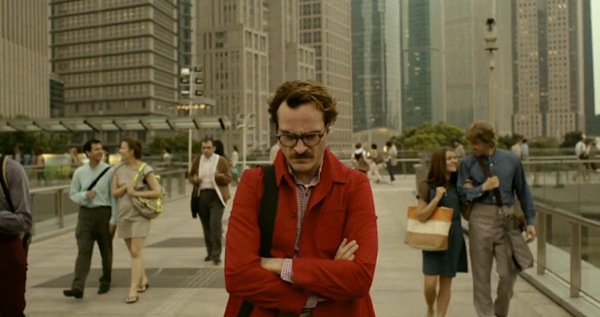
1. HER (w. & d. Spike Jonze)
A simple, utterly earnest love story between a man and his operating system, Spike Jonze's HER should be unbearably twee, but the writer-director has turned the relationship into a moving metaphor for longing. In Samantha (voiced by Scarlett Johansson), the recently divorced Theodore (Joaquin Phoenix) begins to believe he's found his soul mate. As the story progresses, our initial cynicism falls away, and we buy into the bond as something special; the need for sex obviously complicates matters, but that's true of any relationship (it just happens to be a logistical challenge here). Then there is the appetite for something more, something different, someone else, and eventually that lovely, perfect thing they had is over. HER captures the life cycle of a relationship with a heightened sense of exhilaration and loss - which is to say it approximates exactly how it feels when we're in the middle of it. Watching the film, I found myself reflecting on any number of failed relationships, and revisiting the mental gymnastics I engaged in at the time to figure out what went wrong and who was to blame. As it begins to slip away, we feel unloved and unlovable, and we don't want to go on. HER reminds us that we do, even when there are no answers, even when the best thing we had is gone and is never coming back.
Honorable mention: SHORT TERM 12, SIMON KILLER, POST TENEBRAS LUX, PACIFIC RIM, GO FOR SISTERS, LEVIATHAN, UPSTREAM COLOR, COMPUTER CHESS, TO THE WONDER, THE WIND RISES, PASSION, SIDE EFFECTS, BERBERIAN SOUND STUDIO and THIS IS THE END.
Faithfully submitted,
Jeremy Smith (formerly Mr. Beaks)
